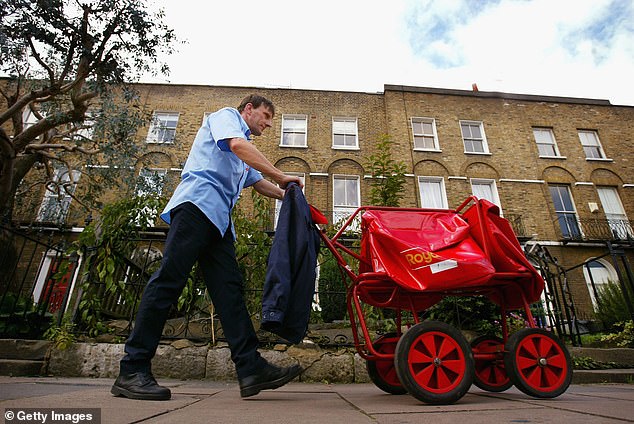Table of Contents
When Paul* became a postman, he delivered letters twice a day by bicycle.
Twenty years later, he says he is exhausted and stressed as the job he once loved has been transformed by changing consumer habits.
The radical changes made to the way couriers operate have caused frustration among Royal Mail employees, even leading to an all-out strike in winter 2022.
Royal Mail management has long campaigned to change its universal service obligation (USO), which requires the company to deliver letters six days a week to all UK addresses.
Paul* has worked as a postman for 20 years, but is increasingly frustrated with management (File image)
Fewer days to deliver letters makes sense in the context of falling volumes and increasing numbers of packages, they say.
Last month, the regulator put forward proposals for a five- or even three-day week. For postal officials, it would mark the biggest shakeup of the system in years.
Paul thinks it would be a disaster. Here, he tells This is Money what he thinks is behind the delays in his letters and why reducing delivery days would make the problem worse…
The changing face of Royal Mail
Paul, who asked to change his name, says when he started his job he was finished at 11am after two rounds of deliveries on his bike.
‘I would arrive at five in the morning, prepare the first-class mail, leave with it and then return to the office. While I was away, the other guys were sorting the second class mail and then you would go out and deliver it.
Royal Mail scrapped the second delivery of the day in 2003, leaving only one mid-morning delivery. At the time he said second mail was not viable as it accounted for only 4 percent of mail and 20 percent of delivery costs.
Paul believes this has contributed to worse delivery times, leading to households complaining about letter parcels being delivered days or even weeks late.
But Royal Mail needs to modernize and some argue it is unfair for officials to expect the company to ignore such big changes in consumer habits.
Peak letter volume was 20 billion in 2004-2005, before email use really took off. Currently the volume of letters is around 7,000 million.
Meanwhile, over the last six years, the average size of a parcel handled by Royal Mail has grown by almost 30 per cent.
In the same period, the number of parcels classified as “large parcels” has more than doubled.
Paul says: ‘Today I had 67 large packages, or “lumps” that are more than the size of a shoe box, in addition to the ones in my bag. About 100 in total.’
Customers have also become accustomed to next-day delivery and simply no longer send letters in the same volume as they did two decades ago.
“We have never been opposed to modernization…” says Paul.
‘But the attitude is that we are lazy and want an easy life. More than the fact that we know the town or walk around because we’ve been doing it for years.’

Royal Mail has long campaigned to change its universal service obligation (USO)
Are posties being ordered to prioritize packages?
While some couriers may want to go back to the old days, they and Royal Mail cannot escape the fact that the service has deteriorated in recent years.
Royal Mail has delivered 90.7 per cent of second class mail in three working days and only 73.7 per cent of first class mail in one working day.
It is well below the regulator’s target of 93 per cent for first-class positions and 98.5 per cent for second-class positions.
There has been some suspicion that post offices are prioritizing packages over letters in an attempt to get through the mountains of packages.
Royal Mail has always strenuously denied this, but Paul says management is ordering posties to do so.
You are constantly late by at least a day or two. It grinds you down, it destroys your will.
‘We have been told to ignore the letters and prefer the tracked ones. It comes from area management and board level (and) that is the only reason there are delays.
‘You have an office manager called a DOM (delivery office manager) and you have someone sitting above them who gives instructions for leaving letters. If you think you can do it, do it. If you can’t then don’t worry.
“We tend to ignore that and look for the ones we think we’d be upset if we didn’t receive: hospital letters, cards… Anything that looks official we’ll grab and take with us anyway because we don’t like not doing our job.
“They say to leave the letters and take the tracked ones, but that means we have two days of work tomorrow and the bags weigh twice as much.” So it means it will take longer to move.
“You are constantly late by at least a day or two. It grinds you down, it destroys your will. You get to the end of the week and you’re tired and fed up.’
A Royal Mail spokesperson said: “We will always do everything we can to ensure that both letters and parcels are delivered on time.” The run-up to Christmas is our busiest time of year, with more than double the normal number of letters and parcels passing through our network.
‘The average parcel size has increased by around 30 per cent in recent years, and in any normal week parcels take up around 90 per cent of the sorting space in our delivery offices.
‘We have always been clear that during busy times, such as Christmas, it may be logistically necessary to dispatch parcels first to avoid network problems, keep mail moving and ensure the safety of our colleagues, especially in the small delivery offices.
“These measures have been shared with Ofcom, which has not identified any suggestion that Royal Mail senior management has ordered the prioritization of parcels over letters outside of recognized contingency plans.”
They also pointed to the recent Ofcom report which found there was no suggestion that management had mandated the prioritization of parcels over letters outside of contingency plans.
However, the report also found there was “insufficient control, visibility and oversight over local decision-making” and has concerns about the functioning of delivery offices.

Couriers say they cannot complete their routes and are asked to leave letters for tracked items (file image)
Who wants to be a postman?
Most employees who spoke to This is Money say they understand that the nature of work has changed but that resources are decreasing.
In 2010, 130,000 postmen worked for Royal Mail in 1,371 delivery offices. Its most recent annual report shows the number has dropped to 90,000 workers in 1,200 offices.
Paul believes retention is the biggest issue: “People don’t understand what it entails and think you’ll just show up, someone will give you a bag of cards and you’ll leave.”
‘Some of the DOMs used to be posties, so you have an idea (of the workload). The problem is that they were postmen 10 years ago, when there was half the work and you finished at 11 in the morning.’
There has been a bitter dispute between Royal Mail and the unions over jobs, wages and working conditions.
Under the agreement reached by the CWU, Royal Mail staff will receive a 10 per cent pay rise over the next three years and a one-off lump sum of £500.
However, it is well below the annual increase in line with inflation, which the union had initially demanded.
Workers will also see changes to sick pay, attendance standards and revised contracts for new employees.
‘If you offer people a decent contract, you won’t have retention problems. If you hire someone part-time, you’ll get a part-time effort,” says Paul.
Royal Mail says its staff turnover is 11 per cent, “well below the industry average”.
How will a three-day week affect deliveries?
Last month, Ofcom said Royal Mail could save up to £200m if it reduced its delivery days from six to five days a week. It could save up to £650m by moving to three days.
Royal Mail boss Martin Seidenberg said: ‘Ofcom’s report shows that reform is urgently needed to protect the future of the single price USO.
“We are doing everything in our power to transform, but it is not sustainable to maintain a network built for 20 billion letters when we now only deliver seven billion.”
Work is not going to disappear. It will sit there and build up.
Any changes to Royal Mail’s USO will face strong opposition from postal officials and their union. The CWU said “the regulator is openly pursuing the failed agenda of the former senior leaders of the Royal Mail Group”.
Paul says: ‘It would be an absolute nightmare. At the moment we are struggling with six days a week. If we go to three days a week, what do we do with the days we don’t deliver?
‘If I deliver on Monday, Wednesday and Friday… When Monday arrives, I will have the publication for Saturday and Monday. I won’t have time so what will I have to do? Read the letters and take the follow-up.
But the next delivery won’t be until Wednesday, so I’ll have work on Saturday, Monday, Tuesday and Wednesday.
‘Work is not going to disappear. It will sit there and build up until we get out and then we won’t have enough time to deliver it all. It’s nonsense.’
Despite his frustration, Paul still enjoys life as a postman: “If I didn’t enjoy it, I wouldn’t be here 20 years later.”
‘It’s heartbreaking and you become resentful. I do rural routes, I know my clients. I see children grow up and get married.
‘They know my name, my family, I know their family. I have three people in the morning for whom I collect newspapers, one of them drinks half a liter of milk every day.
‘People have a lot of trust in Royal Mail. You don’t bat an eye. I deliver to some very private homes, but they don’t look twice if I’m hanging around the back or the driveway. They just say “ah, it’s just the mail.”
Do you work for Royal Mail and want to get in touch with your story? Contact: editor@thisismoney.co.uk
Some links in this article may be affiliate links. If you click on them, we may earn a small commission. That helps us fund This Is Money and keep it free to use. We do not write articles to promote products. We do not allow any commercial relationship to affect our editorial independence.

